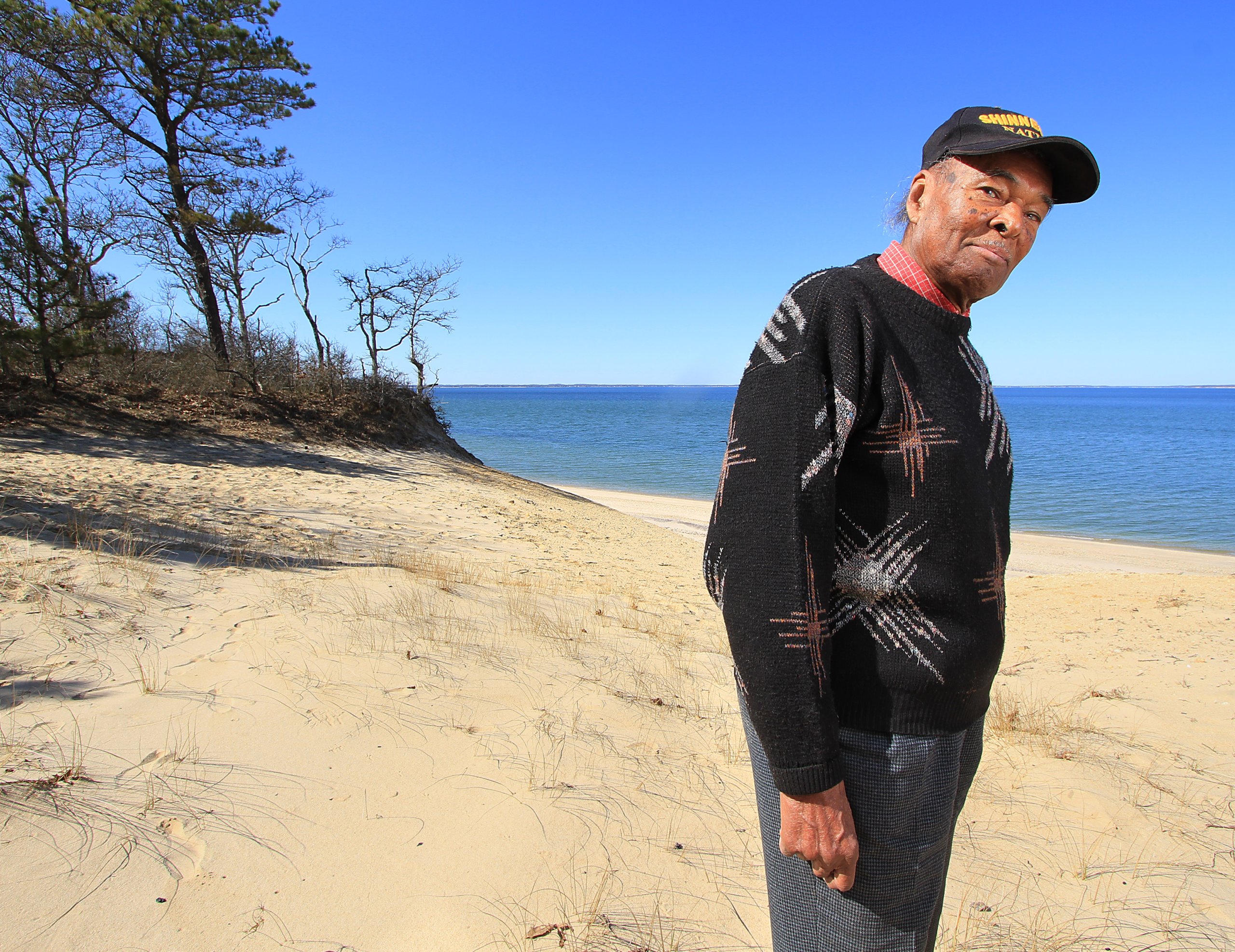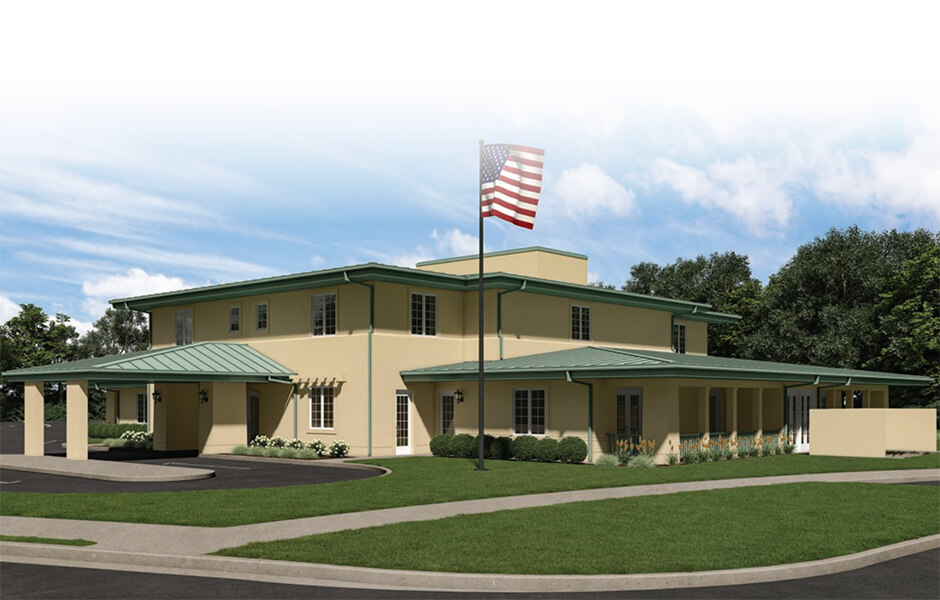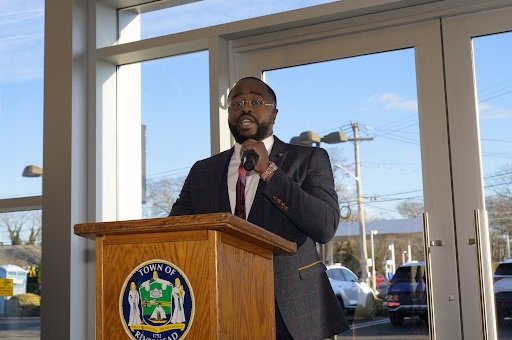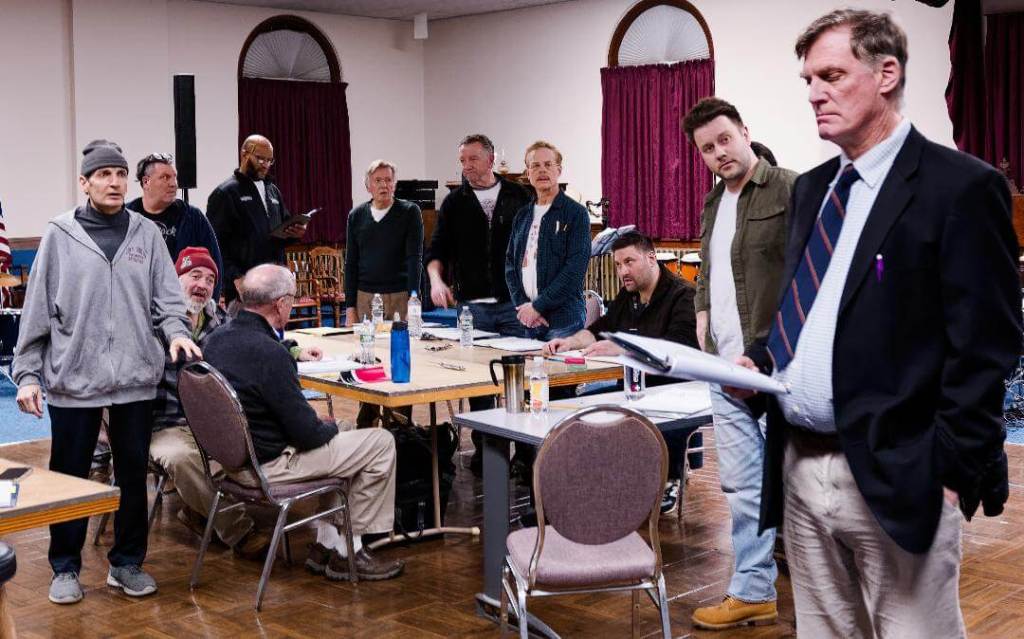Lubin Walter Hunter, Eldest Shinnecock Nation Citizen, Dies at 104

Lubin Walter Hunter, the eldest citizen of the Shinnecock Nation and the eldest World War II veteran on the East End, died on January 17, 2022, at his home on the Shinnecock Territory. He was 104.
Hunter was an advocate for social justice, particularly housing reforms, and he worked tirelessly in the communities he called home throughout his life, from Queens to Shinnecock. Stoic and reserved, he never looked for accolades, but the proof was in the legacy he leaves behind, as someone who truly loved his family, his community and his people — a story his family hopes will reverberate for generations to come.
In his family’s home on the Shinnecock Territory, Hunter was born on May 28, 1917 — seven years before Native Americans were even granted recognized U.S. citizenship in 1924.
His parents, Walter Davis Hunter and the former Marianne Lee, named their youngest child after his maternal grandfather, Lubin Lee. Friends and family would end up calling him Nip or Nippy, as the baby of the family he was always running behind his big brother, Earl.
His father was a gardener and laborer on several wealthy East End estates. When he served in World War I, his citizenship was listed as “alien friendly to the United States,” according to the Hunter family. His mother worked as a domestic.
Hunter began his education at the one-room Little Schoolhouse on Shinnecock, before attending Southampton High School, where he was a star scholastic athlete. He served as the captain of the cross-country track team and set the record for the fastest mile at the school. He often said, “That was easy because we had to walk everywhere!”
He was awarded a scholarship to attend Ohio State University, but, without the money for the application fee for the school, he went to work after high school graduation in 1936. He worked on both the USS Iowa and the USS Missouri battleships at the Brooklyn Navy Yard.
He enlisted in the U.S. Army Air Corps aviation cadet program. (His military records show service from 1938 to 1946, with active duty from 1943 to 1946.) He served as a navigator gunner and pilot on B-17 Flying Fortress bombers, before there was an Air Force, in the Pacific Arena during the war. He earned the rank of corporal.
One of more than 44,000 Native Americans who served during the war, a higher rate than any other ethnic group, according to a 2015 Newsday profile, he was listed as white and served in an all-white unit, as there was no category for Native Americans.
“It’s nothing to talk about,” he said during an oral history recorded in 2014 that was noted in Newsday. “I’d seen enough of the horror we had done, and that’s something I’ll regret all my life.”
After the war, he went to Brooklyn College on the GI Bill and earned a bachelor’s degree in 1953, all while working as a social worker at the New York City Department of Social Services. It was during this time that Hunter was denied housing in the newly established suburb of Levittown, built for returning veterans and their families.
Despite the segregation he faced, he was able to use the GI Bill to obtain a mortgage for his first house in the Baisley Park section of Jamaica, Queens. While residing there, Hunter established the Baisley Park Community League, a civic association that helped to create a desirable family community.
Most of his career was spent working for the New York Housing Authority, and he oversaw public housing in Queens and Brooklyn. Through his management role, he advocated for fair and adequate housing for low socioeconomic communities.
While New York City Mayor Robert Wagner was in office, and during Governor Nelson Rockefeller’s administration, he worked towards community empowerment alongside William Booth, a civil rights leader who would chair New York City’s Commission on Human Rights in the late 1960s, his family said.
He was honored many times over for his advocacy work. In 1956, he was awarded the Phi Beta Sigma Fraternity Honorary Social Action Achievement Award.
In the midst of the novel coronavirus pandemic in 2020, Hunter turned 103, and the community and his family celebrated him with a drive-by parade. He was presented with a proclamation from the Village of Southampton.
Hunter was also a Master Mason in the Hiram Lodge No. 23 since 1955 and was a lifelong member of the Free Masons.
He retired from the Housing Authority in 1973. Never one to rest, he took a job with the Internal Revenue Service in Manhattan as a claims examiner until the 1980s.
Hunter met his first wife, Regina Lois Hillberry, through his grandmother and they married in December 1940. They had two children, Renee Christina and Lubin Michael. The marriage ended in divorce.
Through his cousin and her friend, he met Elaine Bennett, whom he married in March of 1949. They had two children, Wickham John and Roberta Octavia. The couple raised their four children in Queens and moved to Hempstead in 1969.
The family spent summers on the Shinnecock Territory, where the Hunters planned to retire. They were building a house when he was widowed in 1987.
After his wife’s death, Hunter moved to his house on Shinnecock, where he quickly became involved in community work. He became an elder at the Shinnecock Presbyterian Church, served as director of the Senior Nutrition Program, and he was also elected a member of the Shinnecock Tribal Council, serving as a chair on the health committee and on the advisory board for the Shinnecock Family Preservation Center.
“Lubin was always active in organizing, planning and working successful annual Shinnecock Powwows throughout the years,” his family wrote. “He worked in the counting house, greeted visitors at the gate, parked cars, directed traffic and hosted visiting tribal people in his home.”
Hunter attended rallies and appeared in court for all the proceedings involving the advancement of the Shinnecock Nation’s land rights and the successful efforts to achieve Federal Recognition. In recent years, he stood in solidarity with others for the Nation’s right to erect electronic billboards on Sunrise Highway on the Nation’s territory.
His photograph appeared on the signs in memoriam after he passed.
For well over a decade, he also proudly helped with Southampton Village’s annual Fourth of July parade, lining up floats, bands and marchers.
Then there was his beloved game of golf. He golfed well into his 90s, even competing and winning senior tournaments. Even on hot days, he could be found walking a course. One golfer who played with him a decade ago marveled that he not only walked the course better than men half his age, but that he would do push-ups on every tee box while awaiting his turn to hit.
He learned to play the game as a teen while caddying at Shinnecock Hills Golf Club. At the 2018 US Open at the club, he got to meet and spend time with Tiger Woods, whose career he had followed from the beginning.
His love of the sport led him to be one of the founders of the Shinnecock Golfers Association, which provides scholarships, community service opportunities and sponsors family events and activities.
Hunter would play anywhere he could. He traveled the world — Hawaii, Scotland and Canada — with clubs in tow. He spent a lot of time at Indian Island in Riverhead, Southampton Golf Course and Shinnecock Hills, and traveled down south with members of the Shinnecock Golfers Association to compete in tournaments as a senior. He won more than two dozen trophies and plaques.
But, Hunter’s greatest love was his family. “He attended every graduation recital, sporting event and special occasion of his children, grandchildren and great-grandchildren,” his family said.
Hunter is survived by his daughter Renee Hunter of Harlem, his son Wickham Hunter of Shinnecock and his daughter Roberta Hunter of Shinnecock. Ten grandchildren, 15 great-grandchildren and six great-great-grandchildren also survive, as do a host of nephews, cousins and extended family in the Native community from New York to Hawaii.
In addition to his wife, Elaine, he was predeceased by his eldest son, Michael “Tree” Hunter, who died in 2018, and his older brother Earl D. Hunter.
A funeral service was held at the Shinnecock Presbyterian Church on Friday, January 21, with the Reverend Michael F. Smith officiating. A community burial followed at the Shinnecock Cemetery. A private visitation was held for him at Brockett Funeral Home in Southampton.
The family asks that memorial donations be made to the Shinnecock Golfers Association, P.O. Box 2028, Southampton, NY 11969 or East End Hospice, 481 Westhampton Riverhead Road, Westhampton Beach, NY 11978.



